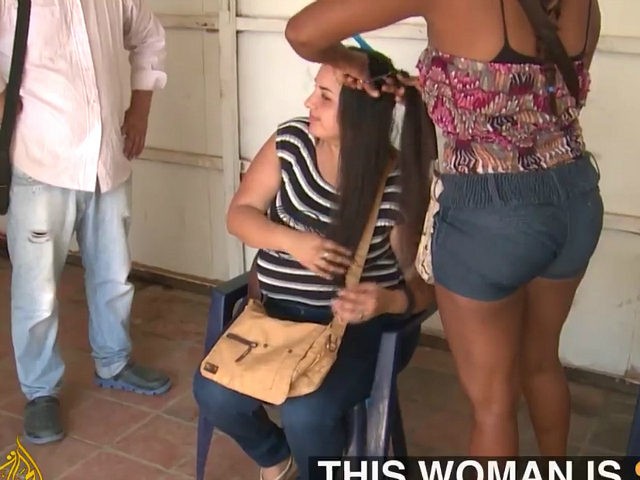Women living near the Venezuelan border region are flocking into neighboring Colombia to sell their hair, sometimes for as little as $20 a head.
Reuters reports that as many as 200 Venezuelan women a day cross the border to sell hair stylists their locks to be used in styling or adding volume to the hair of customers. While the $20 price is small in absolute terms, it could mean a windfall in a country that just began printing 20,000 bolívar bills to keep up with the spiraling inflation. Reuters notes that $20 is “the equivalent of a monthly minimum wage and food tickets” in Venezuela. Due to the socialist rationing system, the government regulates how much food each individual can buy with food tickets or ration cards.
Reuters spoke to one woman who lamented how little her hair had sold for, but she said she had no choice. “I suffer arthritis and I need to buy medicine. This won’t be much, but at least I can buy painkillers,” Celina Gonzales said.
The hair business appeared to begin booming in September. Hair stylists meet their clients at the border to avoid any trouble with Venezuelan police and attract customers by shouting, “we buy hair!” into Venezuela. A November Al Jazeera video showed the cutting and reuse process.
Women in Venezuela are selling their hair to be able to afford basic goods. pic.twitter.com/zonRykIMvN
— Al Jazeera English (@AJEnglish) November 3, 2016
The hair resells at five times its initial sale price on average; stylists charge $100 a customer to weave the hair into extensions and make clients’ hair appear longer or thicker. A woman in the Al Jazeera video protests that the women “do it out of necessity, but they abuse us, too. I felt like I had been raped. They left the bottom of my head totally bald.”
Venezuela’s socialist government has grossly mismanaged the oil-rich nation’s economy for the past 17 years, with dictator Nicolás Maduro now presiding over outrageous inflation and an unwieldy ration system that forces many Venezuelans to spend up to eight hours in a supermarket line to buy basic goods like flour, milk, and vegetable oil. The food crisis in Venezuela is threatening to become a famine as studies show nearly
The food crisis in Venezuela is threatening to become a famine as studies show nearly 90 percent of Venezuelans do not have the means to acquire three meals’ worth of food a day. 15 percent survive by eating garbage disposed of by restaurants and cafes.
Venezuelans, who are able, often book flights abroad in order to purchase toilet paper, laundry detergent, and other goods considered luxuries in the South American nation. Outrageous stories of crime for profit, such as the arrest of a woman for forcing her 12-year-old daughter into prostitution, are not uncommon.
In western Táchira, however, residents have the hope of the border with Colombia. To suffocate this hope, Maduro shut the border with the nation’s neighbor in 2015, claiming that “paramilitaries” had become a threat. In July, an estimated 700 women marched through the border, demanding the right to buy food in Colombia’s well-stocked markets. The act of protest worked, and Maduro opened the border twice that month. 35,000 Venezuelans crossed into Colombia to shop the first weekend; 90,000 the second.

COMMENTS
Please let us know if you're having issues with commenting.